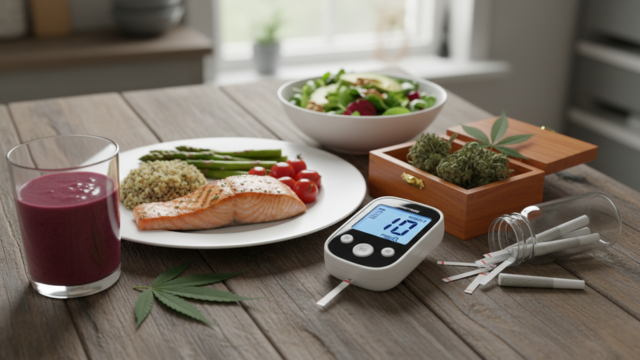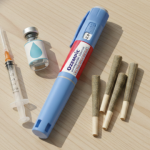Are you at least 21 years of age or hold a valid medical marijuana card?
Daily Specials
{{ special.title }}
{{ special.description }}
*{{ note }}EARTHMED BLOG

Cannabis and Diabetes: What You Need to Know About THC and Blood Sugar

TL;DR Quick Hit
- A 2025 study found cannabis users were nearly 4x more likely to develop type 2 diabetes compared to nonusers
- THC may affect insulin sensitivity depending on body composition and metabolic state
- CBD shows minimal direct impact on blood sugar or insulin
- THCV improved glycemic markers in a clinical trial of type 2 diabetes patients
- Cannabis is not a diabetes treatment. Always monitor blood glucose and consult your healthcare provider
What the Science Really Says About Cannabis and Diabetes
You’ve seen the headlines. One study says weed improves insulin resistance. Another warns it’ll quadruple your diabetes risk. So which is it?
The truth is, cannabis and diabetes have a complicated relationship. Back in the early 2010s, a few studies suggested cannabis users had lower fasting insulin and better glucose metabolism. But those were small, one-time snapshots. They didn’t follow people over time.
Then in 2025, researchers dropped a bomb. They analyzed health records from over 4 million adults and found that cannabis users were almost four times more likely to develop type 2 diabetes than nonusers. That number is too big to ignore, even if the study doesn’t prove causation.
The bottom line? There’s no one-size-fits-all answer, but the risks are real enough to take seriously.
THC, Blood Sugar, and the “Weed Insulin Resistance” Buzzword
Some folks are out here saying weed helps with insulin resistance. And yeah, there is some evidence that THC can improve insulin sensitivity in people with obesity. One observational study showed cannabis users had lower fasting insulin levels and better HOMA-IR scores.
That’s where the phrase “weed insulin resistance” comes from. The idea is that cannabis might help reduce insulin resistance. But here’s the catch: these studies are observational. That means they found patterns, not proof. And what works in people with obesity might not work in everyone else.
Add in the munchies, and things get messy fast. THC boosts your appetite. If you reach for cookies or chips instead of protein and veggies, your blood sugar is going to spike. Plus, THC may blunt your ability to feel low blood sugar symptoms, like shakiness or sweating. That’s dangerous for anyone on insulin.
How Body Type Changes the Game
Cannabis affects people differently based on body fat and metabolic health. THC is fat-soluble. It stores in fat tissue, gets released slowly, and feeds your endocannabinoid system. If you carry more body fat, THC might stick around longer and affect your metabolism differently.
Studies show that any benefits for insulin sensitivity mostly show up in people with obesity or metabolic syndrome. For young, healthy folks, there’s little to no effect. That means cannabis won’t magically “fix” your metabolism if you’re already doing fine.
Type 1 vs. Type 2: Know Your Risks
Let’s get serious for a sec. If you have type 1 diabetes, cannabis could mask warning signs of low blood sugar. That might make you think you're fine when your glucose is actually tanking. Combine that with increased snacking and insulin timing challenges, and you’ve got a recipe for diabetic ketoacidosis (DKA).
There isn’t a definitive study proving cannabis causes DKA, but doctors are seeing the risk in real-world cases. It’s not something to mess around with.
If you have type 2 diabetes, things are a bit more flexible. Some users see improvements in insulin sensitivity, especially if they’re overweight. But that 2025 study still showed higher diabetes risk overall. That tells us cannabis might not be a net win for everyone.
THC, CBD, and THCV: Not All Cannabinoids Are Created Equal
Let’s talk cannabinoids.
- THC: The classic high-maker. May improve insulin sensitivity in certain people, but often leads to increased hunger and blood sugar swings.
- CBD: Non-psychoactive. Doesn’t raise blood sugar, doesn’t cause the munchies. Research says it doesn’t have much effect on glucose, but it might help reduce inflammation, which plays a role in insulin resistance.
- THCV: This is where things get interesting. In a clinical trial, people with type 2 diabetes who took THCV saw lower fasting glucose and better insulin production. Plus, it may suppress appetite instead of increasing it. That’s rare in the cannabinoid world.
If you’re shopping for weed with your blood sugar in mind, check the label. A high-THC strain might hit harder, but a balanced THC:CBD or THCV-rich product could be smarter for your body.
How to Use Cannabis Safely if You Have Diabetes
If you’re going to use cannabis while managing diabetes, make sure you do it with intention. Here's how:
- Monitor your blood sugar closely before and after cannabis use.
- Stick to low doses—2.5 to 5 mg of THC is enough for most people.
- Have low-carb snacks ready to go for when the munchies hit.
- Use earlier in the day so you can track your glucose response.
- Choose products with balanced cannabinoid profiles—CBD or THCV may be better options than high-THC strains.
- Let your doctor know you're using cannabis so they can help you manage any risks.
Quick Reminders About THC and Blood Sugar
Here’s a simple recap of what to keep in mind:
- Keep your glucose monitor handy.
- Don’t use cannabis before bed unless you’ve tested your sugar.
- Choose better snacks before you’re stoned.
- Go for strains with more CBD or THCV if possible.
- Stay in touch with your healthcare team about any changes.
FAQs About Cannabis and Diabetes
Does cannabis raise or lower blood sugar?
Both. THC might help with insulin sensitivity in some people, but it often leads to overeating, which raises blood sugar.
Is cannabis safe for type 1 diabetes?
It carries real risks. THC may hide signs of low blood sugar and make insulin timing tricky. Use only if you’re closely monitoring and have medical support.
Is CBD better than THC for people with diabetes?
Yes. CBD doesn’t affect blood sugar and may help with inflammation. It’s considered safer, though not a treatment.
What is THCV, and should I try it?
THCV is a non-intoxicating cannabinoid that may lower blood glucose and reduce appetite. Early research is promising, but it’s not a cure.
Can I use cannabis to manage diabetes?
No. Cannabis isn’t an approved treatment for diabetes. You can use it as a support tool if you’re careful, but never as a replacement for medication or lifestyle changes.
Do you have diabetes and use cannabis? Hit me up on social media, and let’s spark up a conversation about it!
{{ locations[0].name }}
{{ locations[0].address }}{{ locations[0].city }}, {{ locations[0].state }} {{ locations[0].zip }}
{{ locations[0].phone }}
Hours
Sun: {{ locations[0].hours_recreational.Sunday }}Mon: {{ locations[0].hours_recreational.Monday }}
Tue: {{ locations[0].hours_recreational.Tuesday }}
Wed: {{ locations[0].hours_recreational.Wednesday }}
Thu: {{ locations[0].hours_recreational.Thursday }}
Fri: {{ locations[0].hours_recreational.Friday }}
Sat: {{ locations[0].hours_recreational.Saturday }}
{{ locations[1].name }}
{{ locations[1].address }}{{ locations[1].city }}, {{ locations[1].state }} {{ locations[1].zip }}
{{ locations[1].phone }}
Hours
Sun: {{ locations[1].hours_recreational.Sunday }}Mon: {{ locations[1].hours_recreational.Monday }}
Tue: {{ locations[1].hours_recreational.Tuesday }}
Wed: {{ locations[1].hours_recreational.Wednesday }}
Thu: {{ locations[1].hours_recreational.Thursday }}
Fri: {{ locations[1].hours_recreational.Friday }}
Sat: {{ locations[1].hours_recreational.Saturday }}






